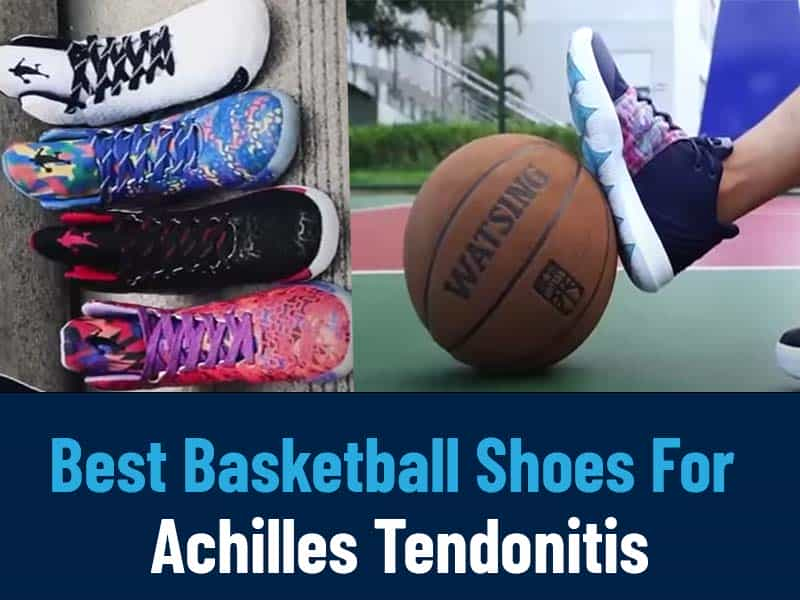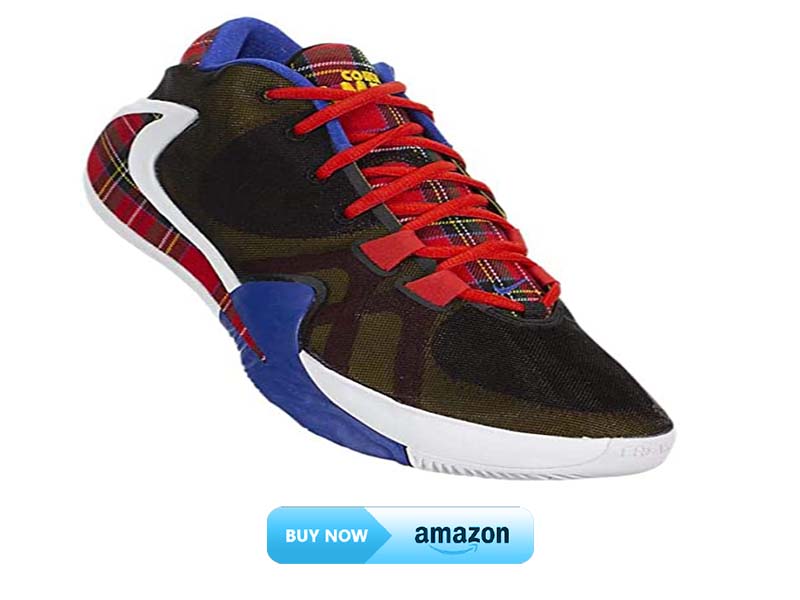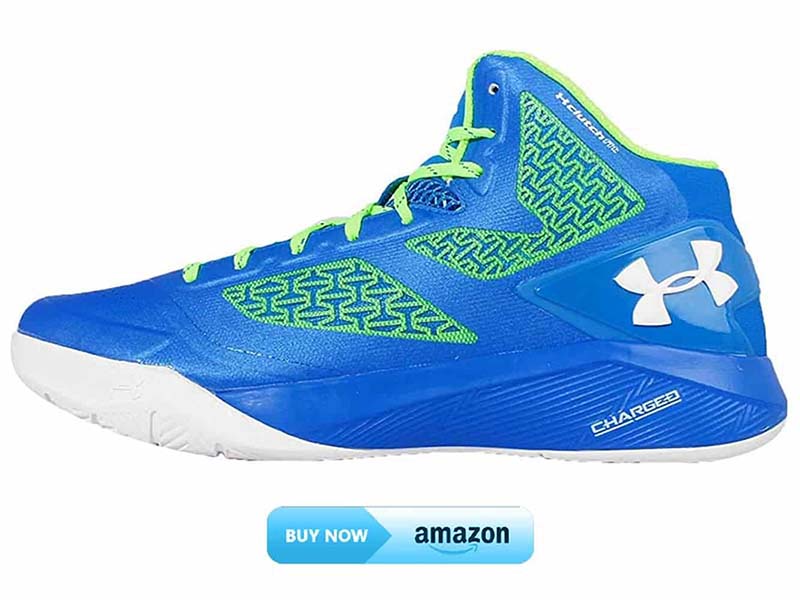Achilles tendonitis is a condition that can cause pain and inflammation in the Achilles tendon, the large tendon that connects the calf muscles to the heel bone. The condition is common in athletes, particularly in those who play basketball.
If you’re a basketball player dealing with Achilles tendonitis, finding the right pair of shoes can be crucial to your performance and recovery.
The good news is that there are a number of different basketball shoes that can help to alleviate the symptoms of Achilles tendonitis.
The best basketball shoes for Achilles tendonitis should provide ample support, cushioning, and stability to minimize strain on the tendon while allowing you to move freely on the court.
In this review, we’ll take a closer look at some of the top basketball shoes that can help alleviate the symptoms of Achilles tendonitis, so you can get back to playing your best game.
Contents
What is Achilles Tendonitis?
Achilles Tendonitis is a condition characterized by inflammation of the Achilles tendon, which connects the calf muscles to the heel bone. It can be caused by overuse, injury, or wearing shoes that provide insufficient support.
How Do You Prevent Achilles Tendonitis In Shoes?
Achilles tendonitis is a common injury that occurs due to overuse of the Achilles tendon, which connects the calf muscles to the heel bone.
Wearing the right shoes is the most essential factor in preventing Achilles tendonitis. Shoes that are too tight or too loose can put excessive pressure on the Achilles tendon, leading to inflammation and injury.
Look for shoes with good arch support, cushioning, and a heel that is not too high or too low.
Let’s check out our top picks of shoes.
The Impact Of Basketball Shoes On Achilles Tendonitis
Basketball is an intense and physically demanding sport that requires proper gear, especially footwear, to avoid the risk of injury, including achilles tendonitis. If you’re a basketball player with achilles tendonitis, then selecting the right basketball shoes is essential to prevent further damage to your tendons.
In this blog post, we’ll discuss how the wrong shoes increase the risk of achilles tendonitis and the relevance of proper footwear in injury prevention.
Discuss How The Wrong Shoes Increase The Risk Of Achilles Tendonitis
Wearing the wrong type of shoes can cause various injuries, including achilles tendonitis. The following are the key points that explain how the wrong shoes can increase the risk of achilles tendonitis:
- Shoes that don’t provide sufficient support or stability can cause the foot to move unnaturally, leading to achilles tendonitis.
- Shoes that are too tight or too loose can cause discomfort and increase the risk of blisters, which can lead to severe inflammation in the achilles tendonitis.
- Shoes that are too heavy can cause the foot to work harder, leading to extra stress on the achilles tendon.
Highlight The Relevance Of Proper Footwear In Injury Prevention
Wearing the right basketball shoes can help you to prevent achilles tendonitis and other forms of injuries. Here are the key points that highlight the relevance of proper shoes in injury prevention:
- Proper footwear can provide support and stability that help prevent the foot from moving unnaturally, which reduces the risk of achilles tendonitis.
- When correctly fitted, shoes can reduce discomfort and help prevent blisters, which can cause inflammation in your achilles tendonitis.
- Proper footwear can help you achieve an optimum balance between weight and comfort that can reduce the risk of overworking your feet and causing undue stress on your achilles tendon.
Choosing basketball shoes for achilles tendonitis requires careful consideration. Make sure to pick shoes that provide proper support, fit well, are lightweight, and have appropriate cushioning to avoid further damage to the achilles tendonitis. Remember that investing in the right basketball shoes is worth it if you want to stay injury-free while enjoying the game.
Best Basketball Shoes For Achilles Tendonitis
If you suffer from Achilles tendonitis, it is important to choose basketball shoes that provide proper support and cushioning to help alleviate your symptoms.
Here are some of the best basketball shoes for Achilles tendonitis:
Nike Zoom Freak Basketball Shoe
These shoes have a low-cut design that allows for greater freedom of movement while still providing excellent support and cushioning for the Achilles tendon.
Are you looking for a basketball shoe that will help people with Achilles tendonitis feel good and support them? The Nike Zoom Freak Basketball Shoe is all you need.
Nike is a brand that has been on the cutting edge of athletic shoes for decades. Their designs are known for being stylish and full of new ideas.
The Nike Zoom Freak 1 Employee of the Month Basketball Shoe is no different. This shoe is a great choice for people with Achilles tendonitis because it has many features that help with the pain.
The shoe’s heel has a Zoom Air unit that cushions and supports your foot, and the upper is made of breathable mesh to keep your feet cool while you play. These shoes have a low-cut design that allows for greater freedom of movement.
The shoe also has a rubber outsole that gives you a good grip on the court. This makes it less likely that you will slip and hurt your Achilles tendon even more.
Pros:
- Helps people who have Achilles tendonitis a lot.
- The Zoom Air unit in the heel gives comfort and cushioning.
- The mesh upper lets air in and keeps feet cool.
- The rubber outsole gives the shoes a great grip on the court.
Cons:
- People with wider feet might not be able to wear them.
- Some people may find that the toe box is too tight.
Verdict:
Overall, the Nike Zoom Freak 1 Employee of the Month Basketball Shoe is a good choice for people with Achilles tendonitis who want a basketball shoe that gives them support and comfort. This shoe will help you do your best on the court thanks to its unique design and many features.
Under Armour ClutchFit Basketball Shoes
These shoes have a lightweight design that is easy on the feet while still providing ample support and cushioning for the Achilles tendon.
The UA ClutchFit upper technology in the Under Armour Men’s ClutchFit Drive II Basketball Shoes wraps your foot in a lightweight second skin for powerful support and a great feel.
This technology kicks in when you put pressure on it, giving you a better fit and feel. The updated ClutchFit technology improves fit and support, which is important for people with Achilles tendonitis.
The shoes also have a 3D-molded tongue that molds to your foot and ankle for a better fit. This makes it less likely that you will slip or hurt your Achilles tendon.
The full-length, molded Micro G sockliner adds cushioning to keep your foot in place and reduces the impact on your Achilles tendon.
The Charged Cushioning midsole is one of the best things about these shoes. It absorbs impact and turns it into responsive speed.
This feature makes it, so your Achilles tendon doesn’t have to work as hard while you play so that you can play for longer and with less pain.
The multi-directional herringbone outsole gives you a better feel and control on the court and makes it less likely that you’ll slip or lose your footing while playing.
The rubber sole also has great traction on the court, giving you the grip to cut and change directions quickly.
Some people might find the toe box too small, but it’s important to remember that these shoes can take a while to get used to before they feel comfortable.
Once they are broken in, though, they give people with Achilles tendonitis great support and comfort.
Overall, the Under Armour Men’s ClutchFit Drive II Basketball Shoes are a great choice for anyone who wants a basketball shoe with great support, comfort, and grip.
Because they are made in a new way and have a lot of features, these shoes will help you avoid getting hurt again and help you play your best.
Pros:
- UA ClutchFit technology provides a superior fit and feel
- Full-length molded Micro G sockliner adds cushioning and support
- Charged Cushioning midsole reduces stress on the Achilles tendon
- Multi-directional herringbone outsole delivers superior court feel and control
Cons:
- Some users may find the shoes to be too narrow in the toe box
- May require some time to break in before they feel comfortable
Verdict:
Overall, the Under Armour Men’s ClutchFit Drive II Basketball Shoes are great for those with Achilles tendonitis. With their innovative design and range of features, these shoes offer great support, cushioning, and traction on the court.
Adidas Pro Bounce 2019 Low Shoe
The pro bounce features a cushioned midsole that provides excellent shock absorption and helps to reduce stress on the Achilles tendon.
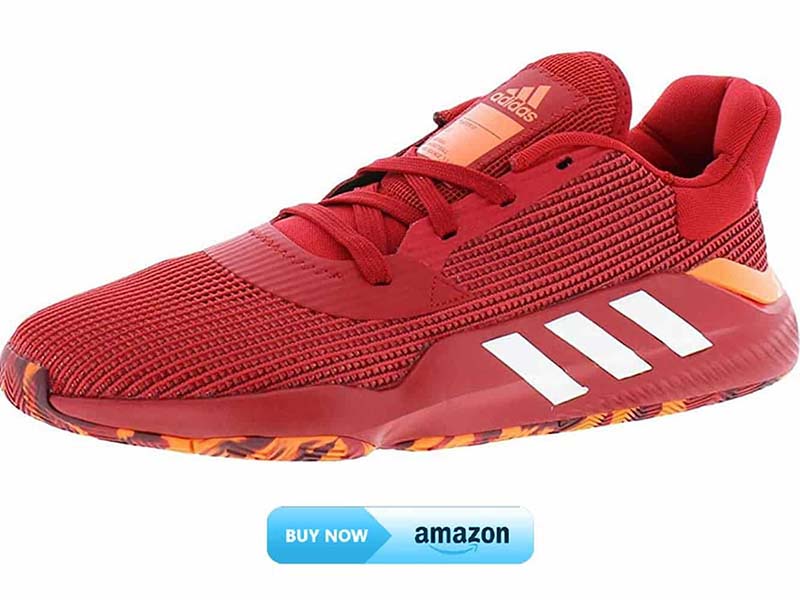
The Adidas Pro Bounce 2019 Low Shoe is made to be light and flexible, which makes it a good choice for people with Achilles tendonitis.
With cushioned pods inside the collar and flexible cushioning in the midsole, these low-cut basketball shoes are comfortable as soon as you put them on. This higher level of comfort and stability makes your Achilles tendon less stressed while you play.
The upper part of the shoes is made of textile, which is light and lets air in. This keeps your feet cool and dry, even during intense games.
The lacing system ensures the shoe fits well, and the TPU lateral bank barrier helps keep your foot in place and reduces the chance of slipping.
The flexible Bounce midsole cushioning is one of the best things about these shoes. It does a great job of absorbing shock and lessening the impact on your Achilles tendon.
The zonal herringbone-pattern rubber outsole helps mimic the natural movement of your foot as you separate.
This gives you a great grip on the court and makes it less likely that you’ll slip or lose your balance.
Some users have said that the shoes can be narrow in the toe box, but because they are so comfortable and supportive, they are a great choice for people with Achilles tendonitis.
The shoes are also made in the US or imported from other countries, ensuring they are of good quality and will last.
Ultimately, the Adidas Pro Bounce 2019 Low Shoe is a great choice for anyone who wants a lightweight, comfortable basketball shoe that is also great for people with Achilles tendonitis and needs good support and cushioning.
The flexible cushioning in the midsole and zonal herringbone-pattern rubber outsole of these shoes make them great for players of all skill levels.
Pros:
- Comfortable, lightweight textile upper.
- Comfort and stability are provided by cushioned collar pods and flexible midsole cushioning.
- TPU lateral banking barrier prevents slipping.
- Bounce midsole cushioning absorbs shock and protects your Achilles tendon.
- Zonal herringbone-pattern rubber outsole provides great court traction and stability.
Cons:
- According to some users, the toe box may be too narrow for wider feet.
- Some users say the sole wears out quickly, and the material frays.
Verdict:
The Adidas Pro Bounce 2019 Low Shoe is good for basketball players with Achilles tendonitis. The cushioned collar, midsole, and TPU lateral banking barrier give the shoes great court comfort and stability.
The flexible Bounce midsole cushioning and zonal herringbone-pattern rubber outsole reduce Achilles tendon impact and improve traction and stability.
The narrow toe box may make the shoes unsuitable for wider feet, and some users have reported durability issues. The Adidas Pro Bounce 2019 Low Shoe is still a great basketball shoe for comfort and support.
Key Factors To Consider When Shopping For The Best Basketball Shoes For Achilles Tendonitis
Basketball is a tremendously demanding game that requires a lot from your body, particularly your feet and ankles. If you’re a regular basketball player with achilles tendonitis, you’ll know how painful and debilitating it can be when trying to play the game.
This is where investing in a good pair of basketball shoes tailor-made for people suffering from achilles tendonitis becomes extremely important. In this post, we’ll discuss the key factors to consider when shopping for the best basketball shoes for achilles tendonitis to help you make the right choice.
Cushioning
Cushioning is one of the most critical factors to consider when shopping for basketball shoes for achilles tendonitis. Basketball involves a lot of jumping and landing, which puts a lot of pressure on your feet and joints. Adequate cushioning eases this pressure, reduces stress on your achilles tendon, and helps mitigate the impact-related shocks.
Here are a few things to keep in mind when considering cushioning:
- Look for shoes that have extra padding around the ankle collar, midsole, and heel.
- Shoes with responsive and thick foam cushioning provide superior shock absorption.
- The air technology from nike is a great example of compartmentalized airbags that provide excellent cushioning and support.
- Adidas boost technology is another option to consider, with great cushioning and energy return.
Ankle Support
Ankle support is critical when it comes to basketball shoes for achilles tendonitis. High tops provide the best support by keeping your ankles stable and reducing the risk of injury. Look for shoes with:
- High top construction that supports your ankles.
- A firm heel cup that locks your foot in place.
- Midfoot shanks that evenly distribute pressure across the foot and reduce the strain on your achilles tendon.
- Lateral support and a snug fit to keep your ankle brace secure during play.
Balance On The Court
Balance is an essential factor to consider when choosing basketball shoes for achilles tendonitis. The ideal shoe should work with your feet, not against them, providing stability and balance. Here are a few features to consider:
- Shoes with a flat sole provide more stability and better balance.
- A lower stack height, such as the nike kobe ad nxt, provides a more grounded feel.
- Shoes with wide bases and outriggers help provide better balance and prevent ankle rolling during play.
- A shoe that allows your toes to stay close to the ground, such as the adidas dame 7, helps provide better stability.
Investing in the right basketball shoes for achilles tendonitis can make a significant difference in terms of your comfort, performance, and overall experience on the court. By focusing on these key factors, you’ll be able to find the best basketball shoes for your needs and get back in the game with confidence.
What Shoes Should I Wear If I Have Achilles tendonitis?
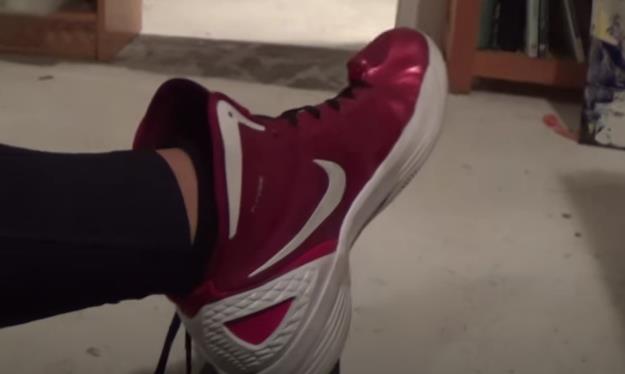
If you have Achilles tendonitis, you should wear shoes with enough support and cushioning to keep the Achilles tendon from getting too stressed.
Here are some general rules to keep in mind when buying shoes:
- Choose shoes with a heel drop of 0–4 mm: Shoes with a lower heel drop will put less stress on your Achilles tendon. Look for shoes with a flat or small drop from heel to toe.
- Look for shoes with good arch support: Shoes with good arch support can help reduce the stress on your Achilles tendon and stop overpronation, which can make Achilles tendonitis worse.
- Choose shoes with a cushioned sole: Shoes with a cushioned sole can help absorb shock and relieve stress on your Achilles tendon. Look for shoes with soft and flexible soles that can absorb shock well.
- Avoid shoes with a tight heel counter: A tight heel counter can pressure your Achilles tendon and worsen your symptoms. Look for shoes with a heel counter that is soft and flexible to support your heel without being too tight. And ensure your shoes are the correct size. When you have Achilles tendonitis, shoes that are too tight or loose can worsen the pain.
- Avoid Flip flop shoes: Don’t wear flip-flops or shoes with high heels because they can put extra stress on your Achilles tendon.
- Consider doctor: If your doctor or podiatrist tells you to, put shoe inserts or orthotics in your shoes. These can help distribute pressure more evenly across your foot and reduce stress on the Achilles tendon.
Before and after putting on shoes, you should stretch your Achilles tendon. That can help make you more flexible and lessen pain and stiffness.
Ultimately, the best shoes for Achilles tendonitis will depend on how bad your symptoms are and how your feet are built. You should always talk to a doctor or nurse when starting any new treatment or exercise routine.
Can Shoes Affect Achilles Tendonitis?
Yes, Achilles tendonitis can be affected by shoes. Achilles tendonitis is a painful condition in which the tendon that connects the calf muscles to the heel bone gets inflamed.
Achilles tendonitis can start or worsen if you wear shoes that don’t support your feet well or don’t fit right.
Too-high heels can put too much stress on the Achilles tendon and make it more likely that you’ll get tendonitis. Shoes with a small or tight toe box can also press on the tendon and cause inflammation.
Also, shoes without enough arch support can cause overpronation when the foot rolls inward. This can put extra stress on the Achilles tendon.
On the other hand, shoes with a lower heel and good support for the arch can help ease the pain of Achilles tendinitis. Wide-toed shoes can also give your toes more room and lessen the pressure on the tendon.
To avoid or treat Achilles tendonitis, it’s essential to wear shoes that fit well and offer the right amount of support for your foot type.
Are Basketball Shoes Good For Achilles Tendonitis?
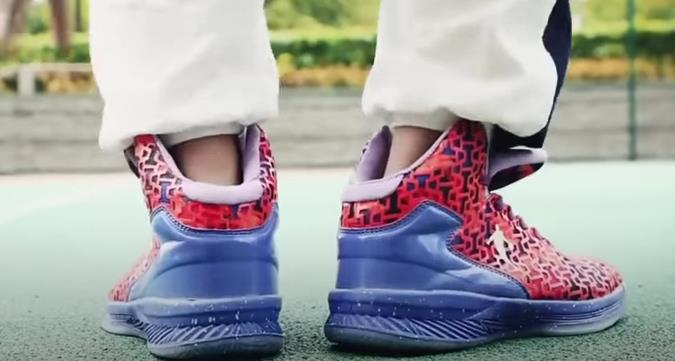
If you have Achilles tendonitis, wearing the right shoes is essential. Even though basketball shoes are made to give your feet stability and support when you move quickly on the court, they may not always be the best choice for people with Achilles tendonitis.
Most basketball shoes have a high top to support the ankle, but this can put more pressure on the Achilles tendon. Also, basketball shoes may have a stiff sole that can worsen the problem by stopping the foot and ankle from moving naturally.
If you have Achilles tendonitis, wear shoes with a flexible sole and a lower heel-to-toe drop. Look for shoes with cushioning and shock absorption to lessen the stress on your Achilles tendon when you’re active.
If you have Achilles tendonitis, it is always best to talk to a doctor before changing your shoes or exercise routine. They can advise you based on your needs and how you’re doing.
Are High Top Shoes Better for Achilles?
High-top shoes may be better for supporting the Achilles tendon because they cover and stabilize the ankle area. The Achilles tendon is a robust, thick tissue band connecting the calf muscles to the heel bone. It can get hurt from overuse or sudden trauma.
Wearing high-top shoes can help stop your ankles from moving too much, reducing the stress and strain on your Achilles tendon when you work out. Wearing shoes with a higher top can also lessen the stress on the Achilles tendon.
But it’s important to remember that wearing high-top shoes might not always stop Achilles tendon injuries. To avoid Achilles tendon injuries, it’s important to stretch and warm up properly, gradually increase the intensity and length of physical activity, and wear the right shoes.
Talk to a doctor or athletic trainer for specific recommendations based on your needs and activity level.
Do Basketball Shoes Help with Jumping?
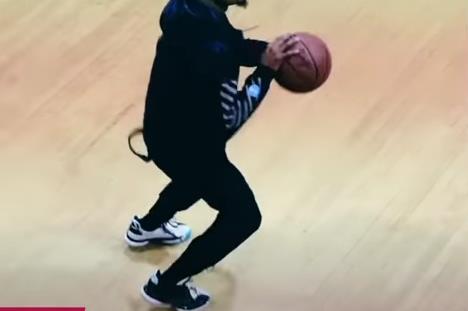
Basketball shoes are made to give basketball players support, grip, and cushioning. Even though they can help players do better, they need help jumping independently.
Most of an athlete’s jumping ability comes from physical skills and training, such as strength, explosiveness, and technique. But basketball shoes have some benefits that can indirectly help a person jump higher.
For instance, most basketball shoes have a cushioned sole that can absorb the shock of landing after a jump, making it easier on the muscles and joints. This can help players avoid getting hurt or tired so that they can jump better and more often.
Basketball shoes also usually have a high top that supports and stabilizes the ankle. This can help players keep their form and avoid injuries, leading to better jumping in the long run.
Even though basketball shoes don’t make you better at jumping, they can help you in other ways, like by giving you more cushioning and support for your ankles. But regular training and conditioning are the most important way to improve your ability to jump.
Tips To Avoid Achilles Tendonitis
A common condition is Achilles tendonitis, inflammation or irritation of the large tendon that connects the calf muscles to the heel bone. Overuse, poor footwear, and biomechanics can cause this condition.
Here are some tips to help you avoid Achilles tendonitis:
- Wear comfortable shoes that support your feet and ankles. Cushioned soles and a firm heel counter help absorb shock and prevent excessive pronation.
- Gradually increase your activity level. Start a new exercise program or gradually increase the intensity or length of the one you already do. This will help your body adjust to the new demands and stop injuries like Achilles tendonitis from overuse.
- Stretch and strengthen your calf muscles to reduce Achilles tendon strain.
- Proper form reduces Achilles tendon stress when running, jumping, or other activities. Avoid overstriding and land on your balls rather than your heels when running.
- Breaking up repetitive movements with cross-training can help prevent Achilles tendon injuries. Alternate between swimming, cycling, and strength training.
- Don’t ignore Achilles tendon pain. Rest, ice, and get medical help to avoid further injury.
These tips can help you avoid Achilles tendonitis and live a healthy, active lifestyle.
FAQ
Can wearing basketball shoes help with Achilles Tendonitis?
Yes, wearing basketball shoes designed to provide proper support and cushioning can help alleviate symptoms of Achilles Tendonitis. Shoes with good arch support, heel cushioning, and a sturdy heel counter can help reduce stress on the Achilles tendon.
How often should I replace my basketball shoes if I have Achilles Tendonitis?
You should replace your basketball shoes every 300-500 miles of use, or every 6-8 months, to ensure that they provide proper support and cushioning. However, if you have Achilles Tendonitis, you may need to replace your shoes more frequently if they start to lose their cushioning or support.
Can I still play basketball with Achilles Tendonitis?
It depends on the severity of your injury. Mild cases of Achilles Tendonitis may not prevent you from playing, but it’s important to rest and allow your tendon to heal properly. Talk to your doctor or physical therapist for guidance on when it’s safe to resume basketball activities.
How do I prevent Achilles Tendonitis while playing basketball?
To prevent Achilles Tendonitis, make sure you warm up properly before playing, wear shoes that fit well and provide good support, and avoid overuse or sudden increases in activity. Strengthening and stretching exercises for the calf muscles can also help prevent Achilles Tendonitis.
Final Words
Achilles tendonitis is a condition that causes the Achilles tendon, the thick band of tissue that connects the calf muscles to the heel, to become inflamed and painful.
The condition is common in runners and other athletes who put a lot of stress on their feet and ankles.
If you do develop Achilles tendonitis, the best shoes for Achilles tendonitis are those that provide good support and cushioning for your feet and ankles.
Running shoes are a good option, as are walking shoes and other shoes designed for high-impact activities. You may also want to consider wearing a boot or brace for additional support.
If you have any questions about the best basketball shoes for Achilles tendonitis, please feel free to leave a comment below.

